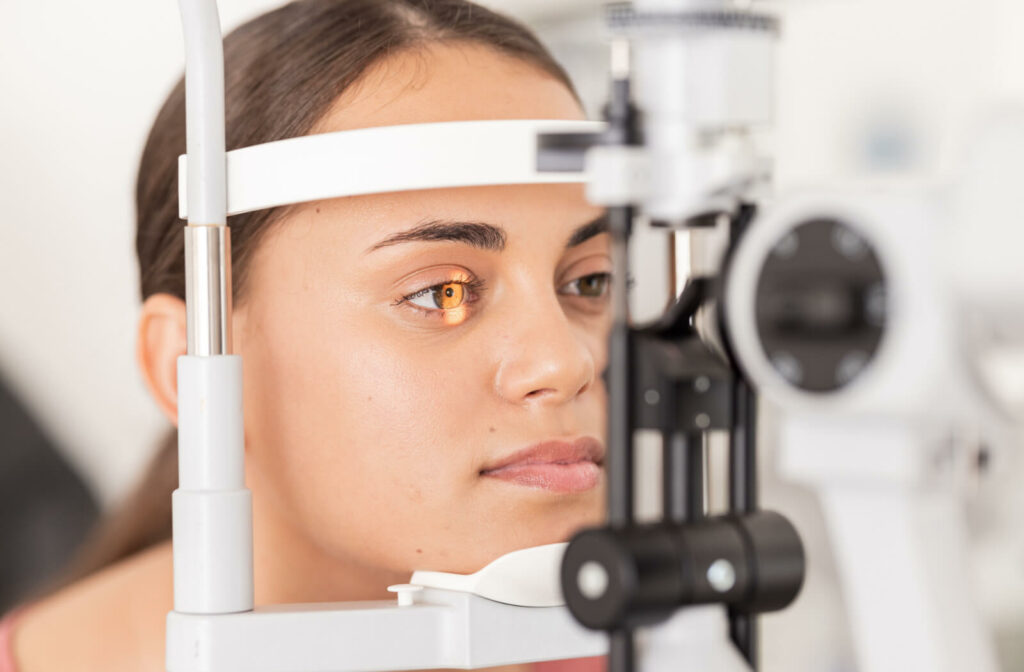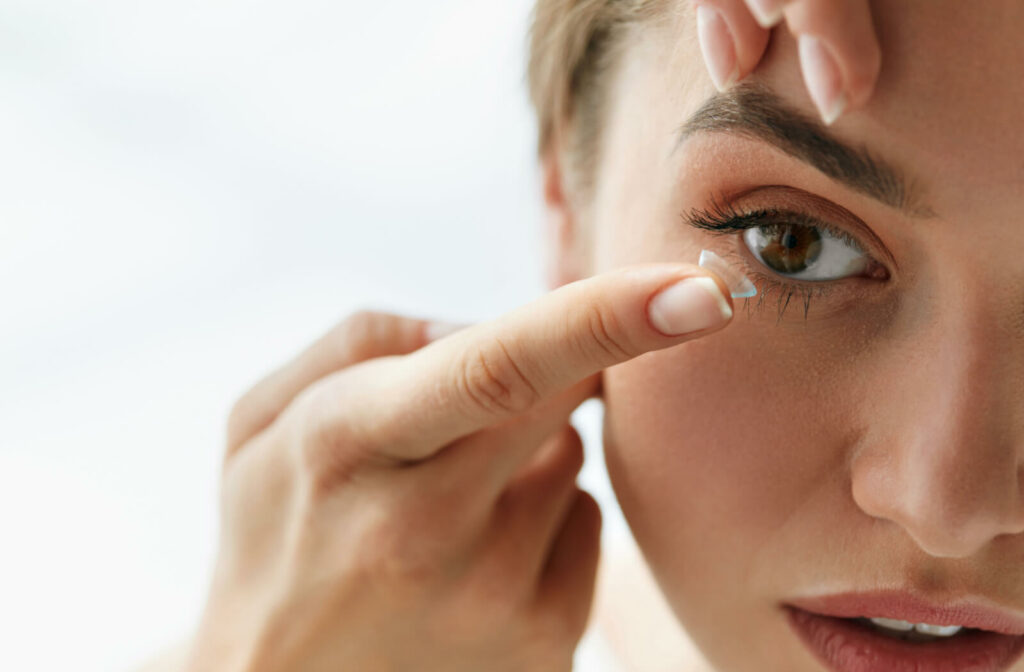Contact lenses have become a popular option for people who need vision correction but don’t want the fuss of eyeglasses. Contacts can be a great solution for many people, but some have concerns about the potential side effects.
A commonly asked question is whether contacts can cause headaches. In short, yes, contact lenses can cause headaches, but there’s more than one reason why or how they might cause headaches. A couple of factors come into play, including potential changes to your prescription and how your contact lenses fit on your eye.
Seeing your eye doctor for eye exams and having a specific contact lens fitting and exam are excellent ways to avoid or minimize the chances of experiencing headaches from your contact lenses.
Can Contacts Lenses Cause Headaches?
While it’s important to note that contact lenses could potentially cause headaches, you should seek the advice of your healthcare provider if you’re experiencing otherwise unexplained headaches often.
In regard to contact lens wear, the following issues could lead to headaches:
Incorrect Prescription
One potential cause of contact lens-related headaches could be an incorrect or outdated prescription. If the lenses you’re wearing are too strong or too weak, they can cause headaches.
Fortunately, an incorrect prescription won’t typically cause any severe or long-term problems. But you should book an appointment with your eye doctor to confirm that your prescription is correct if you experience headaches soon after changing your contact lens prescription.
This is another reason to get comprehensive eye exams as recommended by your eye doctor. Your prescription can change over time. So, even if it was accurate 1 or 2 years ago, it may not be accurate anymore and could cause headaches or other uncomfortable symptoms like nausea, discomfort, or blurry vision.
Incorrect Fit
Contact lenses are not one-size-fits-all. There are a range of lens types and shapes. Scleral lenses and ortho-k lenses are 2 examples of specialty contacts that can each fit differently and perform different jobs. Other types of contact lenses include rigid gas-permeable lenses, soft lenses, hard lenses, and toric lenses.
Each of these types of lenses may have slightly different shapes and ways of fitting. So, you must be fit with the correct lens—improperly fitting contact lenses have been linked to migraines and other issues.
Other Possible Complications from Contact Lenses
Headaches may be a minor complication in most contact lens wearers, but they aren’t the only possible problem.
Dry Eye
Dry eye disease, or simply dry eye, is a prevalent condition that can affect contact lens wearers and non-wearers alike. It’s uncomfortable at the best of times, but it can be severe enough to prevent an individual from wearing contact lenses at all.
Contact lens wear could disrupt your tear film and cause you to experience dry eye symptoms. Fortunately, this is something we can help with. There are contact lenses that can help prevent dry eye and help make wearing contacts more comfortable for those who experience chronic dry eye symptoms.
Infections
Contact lenses are an approved, safe, and effective way of correcting vision. But they come with inherent risks to be aware of. Keratitis is a common infection that contact lens wearers can develop. A few factors that can lead to contact lens-related eye infections include:
- Wearing contact lenses for long periods of time
- Wearing your contacts while you sleep
- A buildup of microbes on your contacts
- Bacteria, fungi, parasites, or viruses
- Using improperly cleaned and sterilized contact lens cases
Corneal Abrasion
Corneal abrasion is another term for a scratch on your cornea, which could be caused by poorly fitted contacts, a foreign object under your contact lens, or overwear. By itself, a corneal abrasion isn’t typically too serious because small ones typically heal by themselves, but you should still visit your eye doctor if you experience any discomfort.
A serious corneal abrasion could lead to corneal ulcers, infection, and other complications. So, it’s important to take care of your contacts and wear them as directed.
Getting the Right Contact Lenses
Contact lenses are regulated by the FDA and you need a valid prescription to purchase them from most suppliers. To get a valid prescription, we will perform a contact lens fitting and exam.
During a contact lens exam, we do more than check your prescription. We also take measurements of your eyes and assess your overall eye health so we can recommend the right contact lens for your vision needs. Additionally, you may be sent home with a trial pair of the chosen lenses so we can verify that they fit comfortably and perform as expected.

Discuss Getting Fit for Contact Lenses
While it’s important to be aware of the complications associated with contacts, they can still be an excellent option for vision correction. Contacts can be a great way to avoid the possible hassle that glasses can cause, and wearing contacts can provide significant benefits while playing sports or doing other activities where glasses might get in the way.
But care must be taken in choosing the right contact lenses, which is where your eye doctor comes in. Give us a call at Optical Illusions if you’re considering contacts. Our experienced optometrists can discuss your vision needs with you and help you choose the right contact lenses.Book your appointment today.



